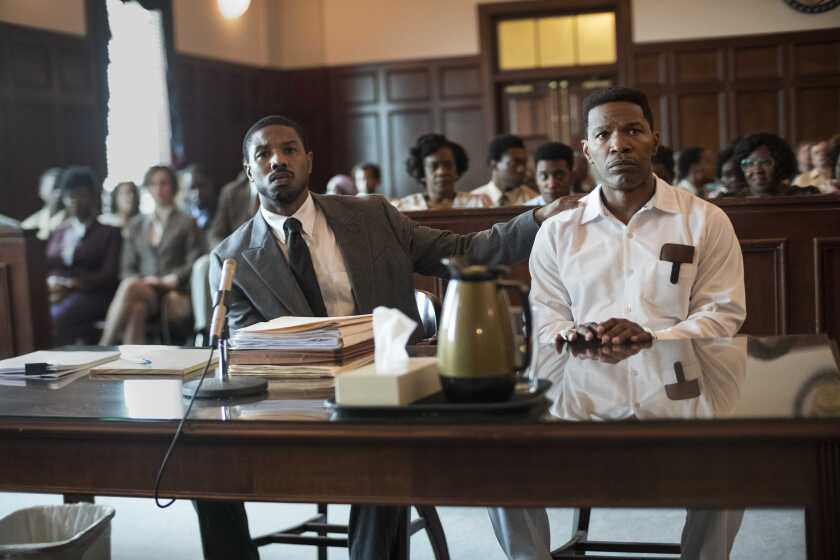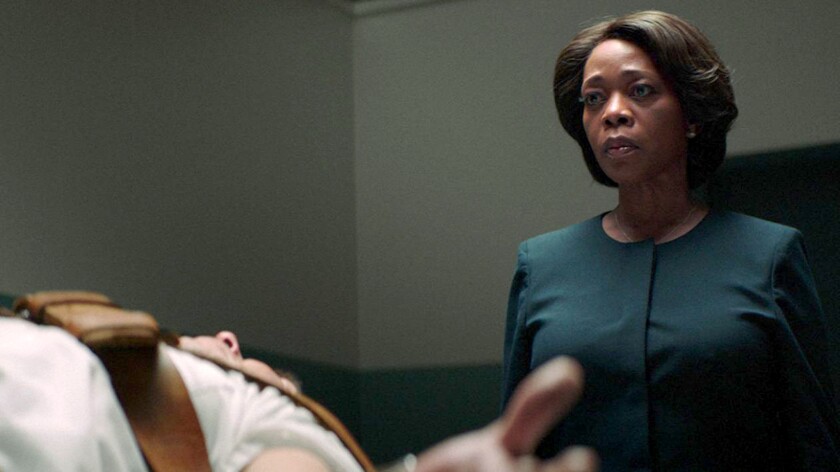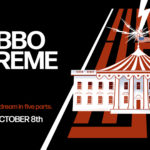By STUART MILLER | DECEMBER 27, 2019 | 5:00 AM

(Jake Giles Netter / Warner Bros.)
One movie’s protagonist fights the power; the other wields it. One shows the potential to change the system; the other, the perils in preserving it.
Despite differences in approach and tone, the two new films — “Just Mercy,” released Wednesday, and “Clemency,” in theaters Friday — share common goals: Directors Destin Daniel Cretton and Chinonye Chukwu, respectively, want audiences rethinking the death penalty and America’s prison-industrial complex.
Cretton’s “Just Mercy” tells the true story of lawyer Bryan Stevenson (Michael B. Jordan), his founding of the Equal Justice Initiative in Alabama and his battle against bigotry and corruption to save the life of death row inmate Walter McMillan (Jamie Foxx).
Chukwu’s “Clemency” focuses on a prison warden, Bernadine Williams (Alfre Woodard), as she and her guards deal with the emotional fallout of an execution gone wrong even while preparing to kill another inmate, Anthony Woods (Aldis Hodge).
Chukwu views these movies as inextricably linked to the work of grassroots activists. “No movie exists in a vacuum,” Chukwu says. “To fight for change, you have to be hopeful to imagine possibilities beyond our world.”
Cretton says a man at a screening told him “Just Mercy” changed his views. “If this film can do that for one person, I think it was worth making.”
Mike Farrell, the MASH star and president emeritus of the advocacy organization Death Penalty Focus, says movies and TV series have the power to “make people aware of the reality of the death penalty.” But capital punishment was rarely tackled in contemporary film and TV until Tim Robbins’ “Dead Man Walking” in 1995.
“Any time you can tell this story, it’s important,” Robbins says. “We do not think about the death penalty, and when we do, it’s abstract. We do not want to know the details. If we did, people would not support it.”
Since “Dead Man Walking,” many other films have shown different aspects of the death penalty, including “A Lesson Before Dying,” “Monster’s Ball” and “Rectify.” Earlier this year, Ed Zwick’s “Trial By Fire” was based on the real-life case of Cameron Todd Willingham, a man executed in Texas for an act of arson that killed his children despite strong evidence that he was not guilty.
“Just Mercy” notes that for every nine people executed in America, there’s one innocent person exonerated from death row. “Clemency” examines the toll that state-sanctioned killing has on those assigned to do the bidding of death penalty supporters. Opposition is also fueled, Robbins says, by “how unevenly applied the death penalty is due to racial and class bias.” A disproportionately high 34% of people executed are black, while 75% of capital punishment cases involve a white victim.
The Trump administration recently lifted a longstanding federal moratorium on the death penalty — an order that was temporarily halted when the Supreme Court said the decision should be adjudicated in an appeals court — but in March, California governor Gavin Newsom declared a moratorium on executions and last month a Texas appeals court blocked an imminent but controversial execution. Additionally, Barry Scheck, co-founder of the Innocence Project, says that for the first time every Democratic presidential candidate opposes capital punishment.
“That’s progress,” Scheck says. “So these movies come at a very good moment when the public view of the death penalty is changing profoundly.
California was the thirteenth state in the last two decades to abolish or place a moratorium on government killing. While DNA testing and advocates such as the Innocence Project, Equal Justice Initiative and Death Penalty Focus have driven the shift, Scheck says movies and series help shape public opinion. Last month, as the Death Penalty Information Center reported on its website, “For the first time since Gallup began asking the question in 1985, a majority of Americans now say life imprisonment is a better approach for punishing murder than is the death penalty.” Those who do support the practice often justify their opinion by citing the cases of serial killers such as Ted Bundy — depicted in the Netflix film “Extremely Wicked, Shockingly Evil and Vile,” which got its title from the judge’s description of Bundy as he sentenced him to death.

(Eric Branco/Sundance Institute)
One reason for the larger shift in opinion is an increasing awareness that lethal injections are more painful than previously thought, leading some to say the practice goes against the 8th Amendment, which bars the infliction of cruel and unusual punishment. It’s a longstanding concern that was addressed in the recent film “The Current War,” which depicted Benedict Cumberbatch’s Thomas Edison, a death penalty opponent, secretly giving advice on how the electric chair could replace hanging if his rival George Westinghouse’s alternating current method was used. Edison thought that his own direct current method would be seen as superior if Westinghouse’s AC voltage was associated with a barbaric killing method. Instead, the electric chair went into widespread use.
“I think there’s a lot more people who are being forced to really look at something they might not have thought about before, and decide where they stand on it,” says Cretton, who was changed by directing “Just Mercy.” “The film brought me into close proximity to a problem that I didn’t really think about much before. Once you meet the people who are affected by that broken system, to laugh and cry with them and feel their humanity, it becomes very hard to look away.”
The death penalty has long been a subject for documentaries, including Errol Morris’ “Thin Blue Line,” which helped free a wrongly convicted man. “Just Mercy’s” Stevenson was the subject of the HBO documentary “True Justice” earlier this year. But while the documentary also explored his group’s social justice work beyond death row, Stevenson says scripted dramas such as “Just Mercy” can have a broader impact.
“There’s no question about it,” he says, pointing to the impact Farrah Fawcett in “The Burning Bed” had on domestic violence discussions. “When you have this kind of celebrity in ‘Just Mercy,’ it generates attention and gives you the opportunity to engage people. That can influence how people think about issues.” (His organization, which typically gets 150 requests for legal help each week, is bracing for a tenfold increase after the movie’s release.)
“Big names are a key,” Farrell agrees, saying that while the black community at the heart of “Just Mercy” is fully aware of the biases and bigotry in the justice system, stars including Jordan, Foxx and Brie Larson “give the movie much more crossover potential.”
Even though it’s a Hollywood movie, Stevenson wanted it to remain authentic, so he worked closely with Cretton and co-writer Andrew Lanham, insisting, for instance, on a subplot about another death row inmate who was guilty of his crime. “I hope the audience cares about what happens to him too.”
In “Rectify,” Ray McKinnon took a similar approach: The protagonist, Daniel, was released from death row, while his death row neighbor Kerwin was executed — but only after McKinnon painted a humane portrait of him as someone who was more than just his worst act. Throughout, McKinnon tried to avoid being heavy-handed about his views.
“I didn’t want it to feel like I was preaching,” he says. “You can’t say to audiences, ‘You’re wrong, now listen to me.’ ”
Similarly, Hodge and Woodard credit Chukwu for telling a story, not imposing talking points on viewers. Hodge says he was drawn to “Clemency” because Chukwu “didn’t force upon the audience her own perspective. She just let the audience see the full effects and consequences so we understand how crippling capital punishment is for all involved.”
Woodard put her own opinions on the death penalty aside to play the warden. “I’m just creating a human being,” she says. “It’s not my job to convince anybody; it’s just to tell them the truth. You can’t dictate what you want the audience to feel.”
She even argues against labeling “Clemency” a death penalty movie, calling it a story about the lives of people working on death row. (Robbins once refused an award from Farrell’s organization out of concern that “Dead Man Walking” might be seen as propaganda. “I just wanted the film to speak for itself,” Robbins says.)
Still, Woodard hopes to inspire public dialogue about capital punishment. With a protagonist who believes in the system, she and Chukwu think the film can reach beyond death penalty abolitionists. “This is an American conversation that has to happen,” Woodard says.
As a filmmaker, Chukwu sought a balance. “We cannot inundate the narrative with our personal politics but we do want the film to be an extension of the advocacy and activism going on.”
“Clemency” has a community engagement push, working with social justice organizations, and an educational component. Stevenson’s organization will provide a “Just Mercy” curriculum for schools, community groups and churches.
The writers and directors see the death penalty as part of a larger story, with McKinnon and Chukwu both saying they’d like viewers to contemplate the entire “prison-industrial complex.”
They speak to the idea of mercy and empathy and to our ideals of what we believe justice to be. – ALDIS HODGE
Zwick says “Trial By Fire” is about a wrongful execution, but “it’s also about all the parts of the system that are broken — the false testimony and withholding of exculpatory evidence but also the poverty in the characters’ lives.”
For Hodge, these films deal not only with the specifics of politics and policy but with bigger themes as well. “They speak to the idea of mercy and empathy and to our ideals of what we believe justice to be.”
Scheck and Stevenson also draw a connection to this year’s Netflix miniseries “When They See Us” about the Central Park Five case. In it, director Ava DuVernay explores the themes McKinnon, Chukwu, Zwick and Hodge all mention and she plays up the emotional impact of the full-page ads that then-real estate developer Donald Trump took out in New York newspapers calling for a return to the death penalty after the boys’ arrests.
McKinnon says these films and TV shows individually may be just “a drop in the big universal pond,” but he believes that “every drop matters.”
Zwick agrees, saying he’s “not naïve enough” to believe any one film will change society. “But I do believe I can become part of a rising chorus. You can’t predict when a paradigm will shift but you have to speak up and hope that it happens.”
Stevenson says he remains hopeful: “There’s a moment now for these films to have resonance that can turn into action and activism.”


